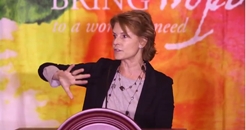 Building a culture of justice in your church
Building a culture of justice in your church
From a talk by Nancy Ortberg
Nancy Ortberg served as a teaching pastor for eight years at Willow Creek Community Church, Chicago and now lives on California where she works at Menlo Park Presbyterian Church as the Director of Leadership Development. She is passionate about helping people connect what they believe with their everyday lives.
In a 10 minute presentation at an IJM Pastors' Gathering in the USA, she talks about how to build a culture in your church which attracts non-believers to Christ. Here are some extracts from the talk:
"I'm going to talk about how you build a culture in your churches in order to reap justice. What goes into the soil and the culture of an organisation over time becomes the environment in which the seeds that we place as leaders start to take root and grow. As my good friend Gary Hamel says, "Culture eats strategy for breakfast." You ought to pay more attention to your culture even than you do your strategy.
"What's true now in our post-modern society is that serving the poor, the marginalised, and the oppressed may be the single most significant form of both spiritual formation and evangelism. You can kill two birds with one stone. Attending to justice in your church gives you a platform for spiritually forming people, and for getting the attention of all the people who won't darken the doors of a church.
"The percentage of people who attend a church where we live is two to four percent. This is not a community of people that are begging to ask what time the weekend services are, but when they see us out in the community coming alongside of the oppressed, and the marginalised, and the poor, and feeding them, and doing education tasks, and taking care of anti-trafficking, we get their attention. As leaders in the church now, reaping justice means paying attention and brushing the dust off of a word that's been cast off to the corner.
"I want to talk about just two words that I think really help you build the soil and culture in an organisation so that you can reap justice and reap change.
Values
"The first is, what are your values? This is really an easy one and a hard one, because here's the truth about the nature of values. Here's how you can tell a value. A value becomes a value when it inflicts pain. It's not a core value in your organisation until you have made hard decisions around limiting yourself, or spending money on resourcing an area to the detriment of some other area. Values, core values, whether it's in a family or in an organisation or in your own life, will cause pain.
"If you are a church and one of your values is to be a biblical church, then I have good news for you. You can use the word justice, because here's the truth. It's God's word. Do you know that Jesus talks more about justice than prayer and what it means to be born again put together?
"A couple of years ago, our church launched two multi-sites, one 20 minutes south of our main campus, one 20 minutes north. About six months into this experiment, the church about 20 minutes north started faltering. They asked me to look after the team as an interim. The location has true socio-economic diversity. Poverty next to affluence. We hired an artist in our church to come up and do a justice wall. Some people were very offended that we used the word social justice. I had to have meetings with these people. After a series of very difficult conversations, holding on to this value that was inflicting a lot of pain, they finally admitted, "We just don't like the word justice." I said, "Do you know what's so ironic about that, is many of you I hear say, "I love to be in the word. I love to be in God's word," and God's word is justice." Those people eventually left.
"If you want to reap justice over time, you have to be patient with people and have conversations with them, but if you keep hitting roadblocks at the end of those conversations, you hold on to the value."
Vision
"The second word is vision - you need to unleash imagination. Imagination, well how do you do that? Primarily you do that by the stories you tell and the heroes that you create in your churches.
"Here's a story about our neighbours where we used to live in Chicago. For seven of the nine years we lived there, every time we invited them to church, would smile and nod and say, "No. We can't go." After seven years of being turned down, one day the husband came running over to me and said, "What time do your church services start?" I said, "Why?" It turned out there was a teachers assistant, who was a single mom, at the school where he and his wife worked. Her husband left her with three children and she lived on a teachers assistant salary. Although she did not go to church, our cars' ministry at our church found out about her and gave her a free car. (They gave away 200 free cars every year). That act of justice brought our neighbours, that a sermon never touched, to Christ, to our church.
"We have people in our church who have raised their own children and are on their hundred and eleventh foster baby. Those are the stories we tell, those are the heroes we create to ignite the imagination of the people in our church who God has given a passion for justice for."
Retweet about this article:
From a talk by Nancy Ortberg, 23/01/2017